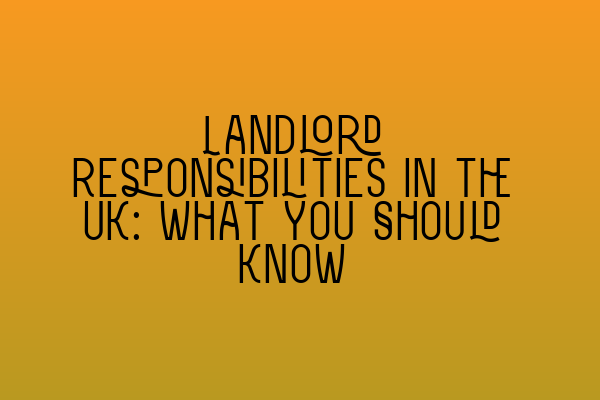Title: Landlord Responsibilities in the UK: What You Should Know
Introduction:
Being a landlord comes with a range of responsibilities. Whether you’re an experienced landlord or just starting out in the property rental business, it’s crucial to understand and fulfill these responsibilities. In this article, we will explore the essential landlord responsibilities in the UK and provide you with the knowledge you need to ensure successful and compliant property management.
1. Understanding the Legal Obligations:
As a landlord, you have a multitude of legal obligations to fulfill. These obligations are in place to protect both you and your tenants. Familiarize yourself with the key legal requirements, such as:
– Gas Safety Regulations: Ensuring all gas appliances and installations are safe, regularly maintained, and inspected by a Gas Safe registered engineer (link to SRA SQE Exam Dates).
– Electrical Safety Standards: Conducting periodic electrical safety inspections by a qualified professional and providing tenants with electrical safety certificates.
– Fire Safety Regulations: Installing smoke alarms on each floor and carbon monoxide alarms in rooms with solid fuel appliances.
– Energy Performance Certificate (EPC): Providing tenants with an up-to-date EPC (link to SQE 1 Practice Exam Questions).
– Right to Rent Checks: Conducting checks to ensure tenants have the right to rent in the UK (link to SQE 2 Preparation Courses).
2. Maintaining the Property:
Ensuring that your rental property is well-maintained is essential for the comfort and safety of your tenants. Regular property maintenance includes:
– Repairs: Promptly addressing any repairs reported by tenants in a timely manner.
– Health and Safety: Ensuring that the property meets all health and safety requirements, including safe staircases, proper ventilation, and secure locks.
– Cleanliness: Providing a clean and well-maintained property at the start of the tenancy and ensuring it remains in that state throughout (link to SQE 1 Preparation Courses).
3. Managing Tenancy Agreements:
Creating a comprehensive tenancy agreement that outlines the rights and responsibilities of both parties is crucial. Ensure that your tenancy agreement covers vital elements such as:
– Rent: Clearly stating the amount of rent to be paid, the frequency of payments, and the accepted payment methods.
– Deposit Protection: Adhering to the legal requirement of protecting the tenant’s deposit in a government-approved scheme.
– Notice Periods: Outlining the notice periods required for both you and your tenants to end the tenancy agreement.
4. Dealing with Disputes:
Even with careful management and communication, disputes may arise during a tenancy. Being prepared to handle disputes in a professional and legally compliant manner is important:
– Deposit Disputes: Following the correct procedure for handling disputes over deposit deductions.
– Tenant Evictions: Familiarizing yourself with the legal eviction process, should you need to take this course of action.
5. Financial Responsibilities:
As a landlord, you have several financial responsibilities to consider:
– Income Tax: Declaring and paying appropriate income tax on the rental income received.
– Insurance: Ensuring you have appropriate landlord insurance coverage to protect against potential loss, liability, and damages.
Conclusion:
Being a responsible landlord involves understanding and fulfilling a range of legal and ethical obligations. By familiarizing yourself with the landlord responsibilities outlined in this article, you will navigate the rental market successfully while providing a safe and comfortable environment for your tenants.
Remember, continuous learning and staying updated with the latest regulations and best practices are key to maintaining a successful and compliant property rental business.
For further assistance with property law and preparing for the Solicitors Qualifying Examination (SQE), explore our SQE preparation courses (link to SQE 2 Preparation Courses) and access SQE 1 practice exam questions (link to SQE 1 Practice Exam Questions).
